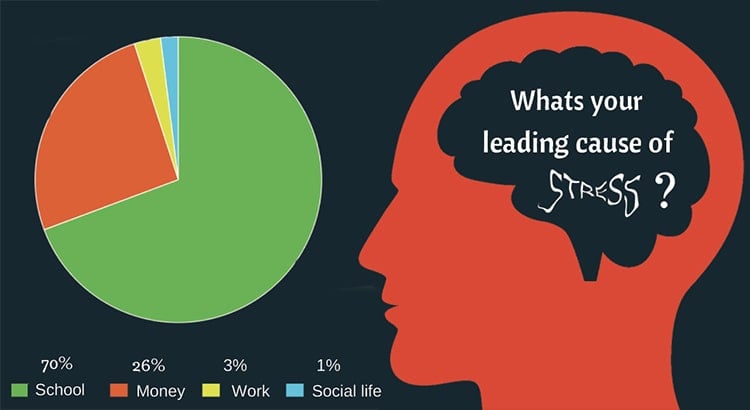After high school, the college experience is a real adventure. When finally moving to campus, students find themselves in a completely new environment with plenty of new friends and qualitatively new relationships with professors, which suggests significant personal freedom. Without exaggeration, when a freshman, you feel like a baseball player who has just hit a home run. However, with an exciting newness and freedom in decision-making previously unknown responsibilities arrive. These often result in stress.

You’ve probably heard about college weight gain, but have you ever thought it would affect you as well? I’m sure no one actually does. Still, a phenomenon is known as “Freshman 15” is an unfortunate reality that affects the majority of college and university students. New responsibilities with which college freshmen often deal increase stress, dragging students into a vicious circle. Stress makes them gain extra weight, and the more weight they gain, the more stress they experience.
College Stress Will Makes You Fat:
Recent research unambiguously suggests that most students are gaining weight in college. Researchers often unite studies that investigate this phenomenon under the “Freshman 15” label, which notifies that on average students gain 15 lb in the first year of college or university. It may seem unbelievable, some people can call it a myth, but the Freshman 15 is real.
The latest studies leave no room for denial. Thus, scientists from the University of Oxford report that two-thirds of all college students leave their campuses with extra weight or even obesity. Their meta-analysis confirms that students gain weight in college due to unique experiences that create more stress. Notably, they don’t become fatter because of all those earlier described new adult-life aspects. Instead, stress prevails and extra weight response occurs because students still lack skills to handle new responsibilities effectively. They develop unhealthy habits in attempts to take everything under control.

Source: sites.psu.edu
Why Students Gain Weight?
It is clear that there is some kind of relationship between college stress and obesity. But how exactly can stress promote weight gain in college students? Scientists argue that stress leads to failures in self-regulation that eventually result in unhealthy eating habits, absence of physical exercises, excessive drinking, and/or lack of sleep. Thus, instead of addressing the sources of stress, students develop habits that actually aggravate their conditions, contributing to weight gain along with more stress. Obviously, this is a very dangerous tendency, which, if not addressed, can destroy both one’s health and academic success. Thankfully, there are several techniques of stress management that students can apply. Although these strategies will not resolve all the issues at once, they will help gradually reduce stress.
Why Stress Occurs?
It is virtually impossible to manage stress adequately when you are overwhelmed with tasks. Even healthy diets coupled with regular exercising will hardly save you from stress completely, although they can somewhat reduce pressure. Students sink into stress, gaining weight because they must write several research papers at a time, learn several dozens of new terms or concepts, complete a lab report by the next class, and who knows what else. Of course, every college subject is unique. It is a precious opportunity to improve one’s knowledge. But sometimes, professors’ expectations are so high that it seems they forget their students attend several subjects at a time.

Source: ulmhawkeyeonline.com
Matching Academic Success with Healthy Habits:
If students are really interested in meeting those expectations without sacrificing their own health which is priceless, they should buy research papers today. Indeed, how else can you succeed when two, three, or even more professors simultaneously expect you to attribute 100 percent of your time, attention, and effort to their tasks? Under such circumstances, outsourcing is the only correct answer. Effective stress management is an important asset, which enables students to set priorities and delegate less important activities to others. Thus, students can get a chance to concentrate on what really matters to them, simultaneously preserving their good habits along with a healthy waistline.

Source: goodcall.com
Why Manage Stress?
Education is a ladder to professional success, and it is very important to be successful right from college. For many students, it is not enough to earn a passing grade. Instead, they are interested in results that will distinguish them from peers, thus securing better fellowship or employment opportunities. But higher grades often come at a price. They require time and energy, depriving students of not only leisure and communication with friends but also healthy sleeping and exercising. Excellent time and stress management can improve the situation, bringing balance into the turbulent college life. Thus, college stress management is not only about health, but also about future professional success.
Enjoy Your College Life:
There is such an abundance of information now that it is impossible to learn everything. But the fact that we live in an information age doesn’t suggest that we should change our college life into hell. Therefore, students should make decisions that will bring more personal benefits. Adequate stress management can eliminate college weight gain issues, enabling students to enjoy their experiences. It will remove academic pressures, contributing to life quality and future success. Make your college years worth remembering!
Author’s Bio:
Michael Turner is an experienced academic writer, researcher, and editor. His reviews on the topic are motivated by a personal and professional interest in academic stress as a source of obesity. The writer’s contribution to the research of this topic is valuable for the institutions he collaborates with and the society as a whole.
